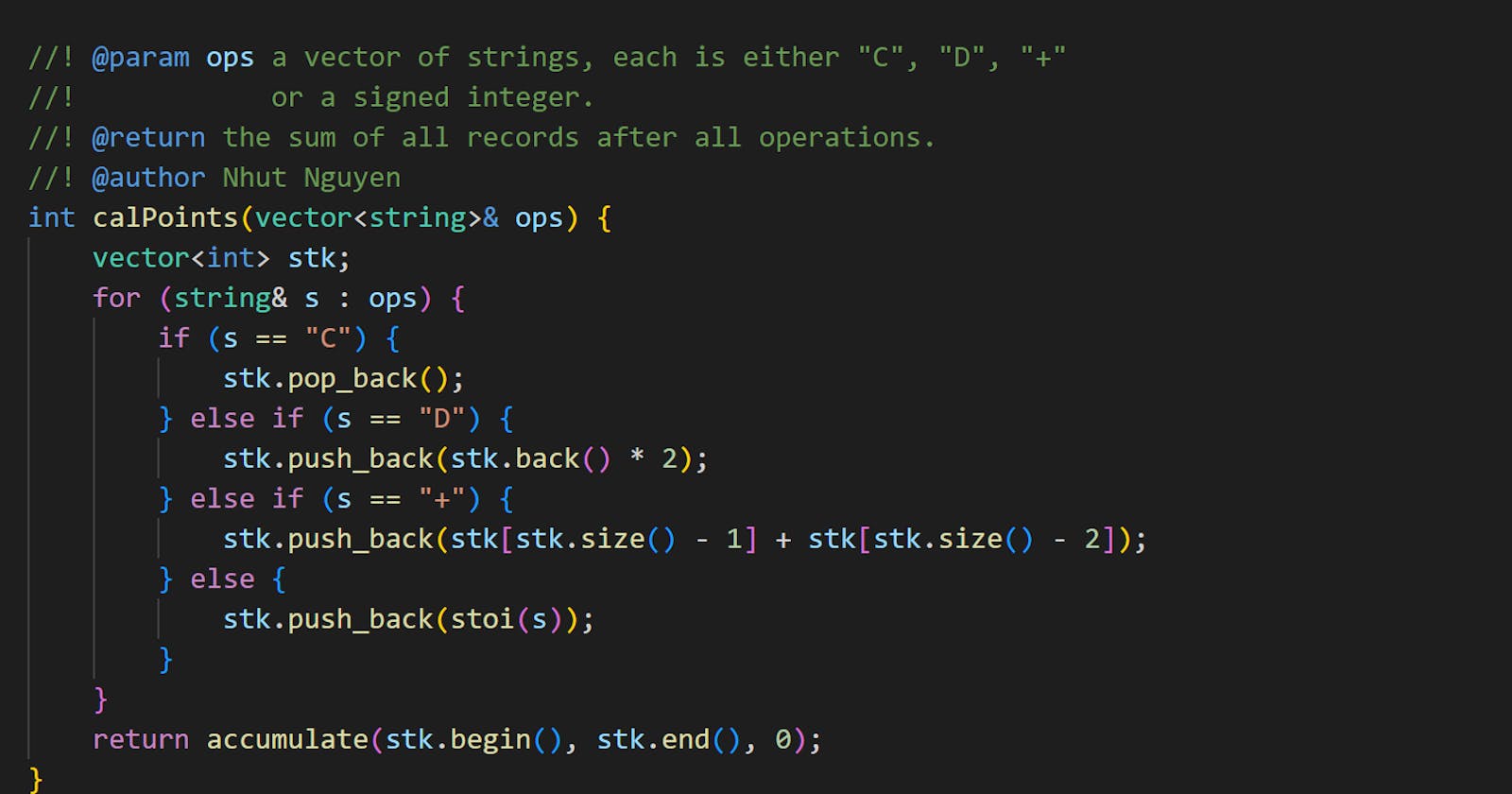Problem statement
You are keeping score for a baseball game with strange rules. The game consists of several rounds, where the scores of past rounds may affect future rounds' scores.
At the beginning of the game, you start with an empty record. You are given a list of strings ops, where ops[i] is the i-th operation you must apply to the record and is one of the following:
An integer
x- Record a new score ofx."+"- Record a new score that is the sum of the previous two scores. It is guaranteed there will always be two previous scores."D"- Record a new score that is double the previous score. It is guaranteed there will always be a previous score."C"- Invalidate the previous score, removing it from the record. It is guaranteed there will always be a previous score. Return the sum of all the scores on the record.
Example 1:
Input: ops = ["5","2","C","D","+"]
Output: 30
Explanation:
"5" - Add 5 to the record; the record is now [5].
"2" - Add 2 to the record; the record is now [5, 2].
"C" - Invalidate and remove the previous score; the record is now [5].
"D" - Add 2 * 5 = 10 to the record; the record is now [5, 10].
"+" - Add 5 + 10 = 15 to the record, record is now [5, 10, 15].
The total sum is 5 + 10 + 15 = 30.
Example 2
Input: ops = ["5","-2","4","C","D","9","+","+"]
Output: 27
Explanation:
"5" - Add 5 to the record; the record is now [5].
"-2" - Add -2 to the record; the record is now [5, -2].
"4" - Add 4 to the record; the record is now [5, -2, 4].
"C" - Invalidate and remove the previous score; the record is now [5, -2].
"D" - Add 2 * -2 = -4 to the record; the record is now [5, -2, -4].
"9" - Add 9 to the record; the record is now [5, -2, -4, 9].
"+" - Add -4 + 9 = 5 to the record, record is now [5, -2, -4, 9, 5].
"+" - Add 9 + 5 = 14 to the record, record is now [5, -2, -4, 9, 5, 14].
The total sum is 5 + -2 + -4 + 9 + 5 + 14 = 27.
Example 3
Input: ops = ["1"]
Output: 1
Constraints
1 <= ops.length <= 1000.ops[i]is"C","D","+", or a string representing an integer in the range[-3 * 10^4, 3 * 10^4].For operation
"+", there will always be at least two previous scores on the record.For operations
"C"and"D", there will always be at least one previous score on the record.
Solution
Code
#include <vector>
#include <iostream>
#include <string>
#include <numeric>
using namespace std;
int calPoints(vector<string>& ops) {
vector<int> stk;
for (string& s : ops) {
if (s == "C") {
stk.pop_back();
} else if (s == "D") {
stk.push_back(stk.back()*2);
} else if (s == "+") {
stk.push_back(stk[stk.size() - 1] + stk[stk.size() - 2]);
} else {
stk.push_back(stoi(s));
}
}
return accumulate(stk.begin(), stk.end(), 0);
}
int main() {
vector<string> ops{"5","2","C","D","+"};
cout << calPoints(ops) << endl;
ops = {"5","-2","4","C","D","9","+","+"};
cout << calPoints(ops) << endl;
}
Output:
30
27
Complexity
Runtime:
O(N), whereN = ops.length.Extra space:
O(N).
Implementation notes
The data structure
stkyou might need to solve this problem is a stack. But here are the reasons you had better usestd::vector:std::vectorhas also methodspush_back(value)andpop_back()like the ones in stack.On the other hand, a stack does not give easy access to the second last element for the operator
"+"in this problem.
accumulate(stk.begin(), stk.end(), 0)computes the sum of the vectorstk.
References
Thanks for reading. Feel free to share your thought about my content and check out my FREE book “10 Classic Coding Challenges”.

